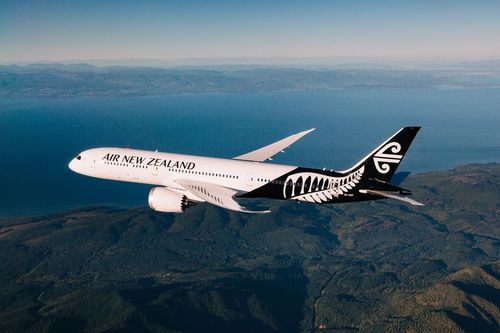Air New Zealand receives 500,000-litre delivery of SAF

SOURCE: Air New Zealand
July 2, 2024
BY Air New Zealand
Air New Zealand in late June received a shipment of sustainable aviation fuel (SAF) into Wellington, its first delivery to the nation's capital city and another small step towards its target of net zero carbon emissions by 2050.
Manufactured by EcoCeres in China from 100% used cooking oil and supplied and blended by Exxon Mobil, the 500,000-litre delivery is equivalent to *165 flights on an A320 aircraft between Auckland and Wellington. The SAF delivered to Wellington represents life-cycle carbon emissions savings of at least 80 percent compared with fossil jet fuel.
Air New Zealand's Chief Sustainability and Corporate Affairs Officer, Kiri Hannifin says moving away from purely using fossil fuels for Air New Zealand's operations is critical.
Advertisement
Advertisement
"As the main driver of climate change, the global economy, including New Zealand, must rapidly transition away from our high reliance on fossil fuels. For a small island nation in the South Pacific, alternatives are even more important because we are heavily reliant on flying to connect with each other in our own country, as well as when we travel abroad. Aviation also plays a very important role supporting New Zealand's trade and tourism sectors.
"To keep doing all these activities which enrich our country's economy we must act as quickly as we can to transition to a lower-carbon future. At the moment, SAF is the key way aviation will move towards this.
"Airlines are signing supply arrangements for SAF 10 years into the future and beyond, so we need to be part of the picture from the start otherwise New Zealand may fall behind. While the volumes of SAF we are buying are very small compared to the amount of fossil jet fuel we use, they give an important signal to alternative fuel producers that we are open for business," says Ms Hannifin.
"We've seen increased international momentum around SAF in the past few months, with airlines, governments, airports, and fuel companies all getting on board with alternative fuels at pace.
Advertisement
Advertisement
"From 2026, our aircraft will be required to uplift SAF when we fly home from Singapore and Vancouver. Japan has announced a SAF requirement from 2030, and other countries are also making signals that SAF will be mandated for all airlines for outbound flights including in Australia, Indonesia, Hong Kong and China.
"These moves across different jurisdictions are being put in place to stimulate and fast track the production of alternative fuels and encourage oil and gas companies to speed up their transition away from fossil fuels."
Climate Change Minister Simon Watts says, "Transport energy accounts for 18 percent of New Zealand's total emissions, so it is encouraging to see the industry take steps towards sustainable practices as New Zealand transitions to a low emissions future."
The International Air Transport Association (IATA) recently announced the production of SAF is projected to triple in 2024 but will still only be able to supply 0.53 percent of total aviation fuel needs. Air New Zealand is currently involved in two feasibility studies which look at opportunities for local production of alternative jet fuels.
Related Stories
A bill to formally adopt a revenue certainty mechanism to support the production of SAF was introduced in the U.K. Parliament on May 14. The proposed scheme is in the form of a guaranteed strike price.
Delta Air Lines on May 7 announced its strong support for new bipartisan, bicameral legislation that will accelerate the growth of sustainable aviation fuel (SAF) in Michigan. The bill aims to create a SAF tax credit of up to $2 per gallon.
The U.S. EPA on May 14 delivered two RFS rulemakings to the White House OMB, beginning the interagency review process. One rule focuses on RFS RVOs and the other focuses on a partial waiver of the 2024 cellulosic RVO.
The U.S. EPA on May 15 released data showing nearly 1.79 billion RINs were generated under the RFS in April, down from 2.09 million generated during the same month of last year. Total RIN generation for the first four months of 2025 was 7.12 billion.
The House Ways and Means Committee on May 14 advanced its portion of President Trump’s “big, beautiful” tax bill. The draft legislation amends and extends the 45Z clean fuel production credit but repeals several other clean energy tax credits..
Upcoming Events










